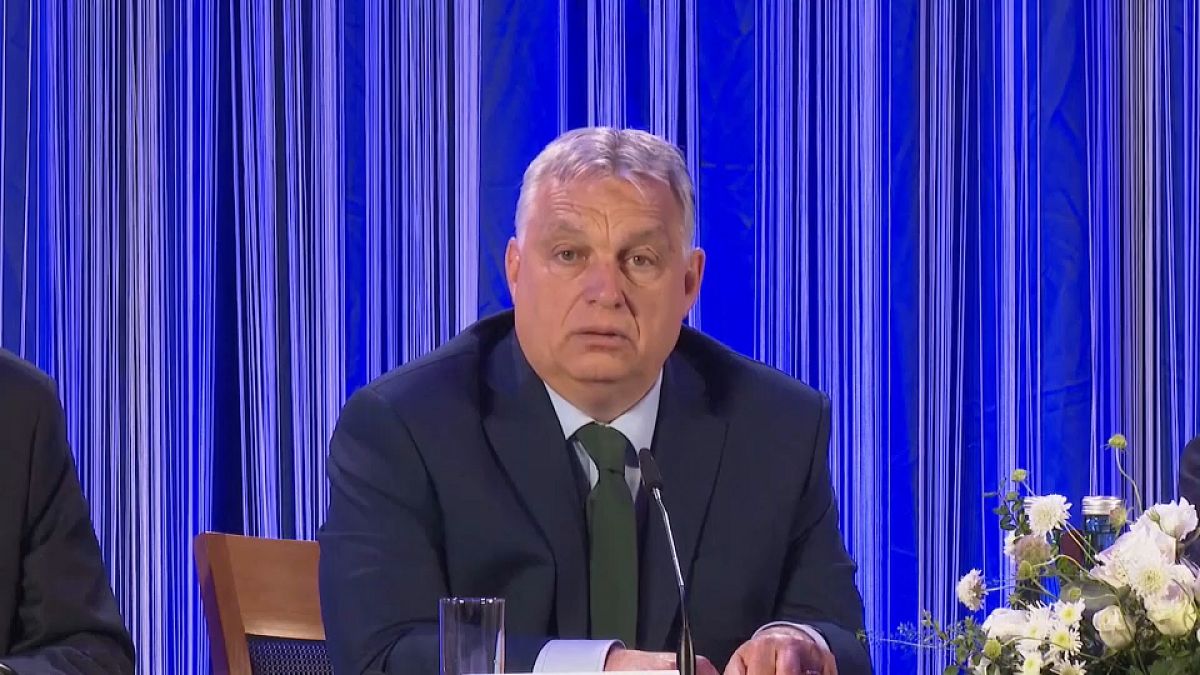Prime Minister Viktor Orbán has long been accused of dismantling democratic institutions and violating the EU’s standards on the rule of law, leading the bloc’s legislature in May to call for the presidency to be taken out of Hungary’s hands entirely.
Hungary takes over the rotating presidency of the European Union on Monday and some MEPs in Brussels may be wondering whether populist Prime Minister Viktor Orbán will use the role to further his reputation as the bloc’s main spoiler.
Orbán has in recent years appeared to relish opportunities to play counter to general EU consensus by blocking, watering down or delaying key EU decisions and routinely going against most other leaders on issues like the war in Ukraine and relations with Russia and China.
His often vocal opposition to EU policies and positions has long frustrated his partners in the bloc and pushed him to the margins of the continent’s mainstream.
Make Europe Great Again
Hungary’s motto for its presidency — Make Europe Great Again — raised eyebrows in some quarters for its resemblance to the famous tagline used by former US President Donald Trump.
The EU presidency rotates among the bloc’s member countries, and while the post holds little real power, it does allow countries to put their priorities high on Europe’s agenda.
Now, as Hungary gears up to preside over the 27-nation bloc for the coming six months, some analysts expect it to maintain its anti-EU rhetoric.
But the timeline of its presidency, beginning with a lengthy summer break and a transitional period of forming a new European Parliament and executive commission, is expected to give Budapest few opportunities to significantly derail the bloc’s priorities.
“These six months are altogether not that long, which means that Hungary cannot do potentially much harm, even according to the critics,” said research fellow at the Centre for Euro-Atlantic Integration and Democracy, Dorka Takácsy.
As Hungary’s takeover approached, leaders in Brussels rushed to push through important policy decisions while Belgium still held the presidency.
Last week the EU launched membership talks with Ukraine and Moldova. Orbán has voiced his opposition to Ukraine’s candidacy and threatened to block it. His government has also held up EU efforts to channel badly-needed funding into Ukraine.
“All the meaningful steps from the European side regarding Ukraine were already done,” Takácsy said. “A Hungarian delay, according to most European leaders, is already calculated and being taken into consideration as if it’s something which is most likely going to happen.”
Orbán has long been accused of dismantling democratic institutions and violating the EU’s standards on the rule of law, leading the bloc’s legislature in May to call for the presidency to be taken out of Hungary’s hands entirely.
In a resolution, the EU parliament argued that democratic deficiencies raised questions of “how Hungary will be able to credibly fulfil this task in 2024.”
Two years ago, the European Commission froze billions of euros in funds to Budapest over concerns about democratic backsliding.
But some Hungarian officials have stressed that they plan to act constructively during their presidency.
Last week, Hungarian minister for EU affairs János Bóka told reporters that “we will be honest brokers, working loyally with all Member States and institutions.”
“Carrying out the functions of the presidency is our obligation, but we see it primarily as an opportunity,” Bóka said. “At the beginning of the new institutional cycle, we can initiate a debate and set the agenda on issues that are important to us.”
Among the issues that Hungary has prioritised in its seven-point program is the enlargement of the EU in the Western Balkans for countries like Serbia, North Macedonia, Montenegro and Albania through a “merit-based” procedure.
Budapest has also vowed to strengthen the EU’s external borders and step up against illegal immigration, and to address “demographic challenges” that involve an aging population in Europe — two priorities that reflect Orbán’s image as a staunch opponent of immigration and defender of family values.
But after years of campaigns portraying the EU as forcing unwanted policies on Hungary, Orbán has repeatedly compared membership in the bloc to more than four decades of Soviet occupation of his country. This means he may find it difficult to restore goodwill among his EU partners.
Read the full article here
